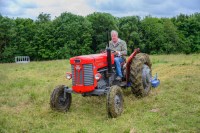‘No ifs. No buts. Heathrow must have a third runway.’ This was our motion of the evening at last night’s Spectator debate, but when it came to kick-off time, it appeared the audience was there for the taking. The pre-vote count found a majority of nine votes against the motion, but with 21 undecided attendees, everything was still left to play for.
Graham Brady – Chairman of the 1922 committee, and MP for Altringham and Sale West (with Manchester Airport on his doorstep, he added) – opened the debate by speaking for the motion. With more than a nod to David Cameron’s conference speech in Birmingham, Brady argued: ‘We are in a global race today… Sink or swim. Do or decline.’
Two years before he was born, he said, an airport in the Thames Estuary was first proposed. We have had fifty years of dither and delay, and we need a decision now. Not after the 2015 election.
Building an airport in the East of London would shift the economic centre of the country even further into the south East, argued Brady. Why not connect HS2 to Heathrow – thus enabling the airport to connect properly to the regions? A new airport would need new infrastructure – schools, homes. A third runway at Heathrow is the quickest, most affordable, and the most likely to happen solution to our problems. We should get on with it.
John Stewart, of HACAN ClearSkies, representing residents under the Heathrow flight path, wasn’t so sure. We have enough airport capacity until 2030, he said – there’s no rush to make a decision one way or the other. The way forward, he said, was not to create more capacity, but to remove the regulations surrounding our airports at the moment. Agreements such as ours with China, which restricts the UK from operating just 62 flights to China per week, need to change. We need a better, rather than a bigger, Heathrow.
Tim Yeo, chair of the Energy and Climate Change select committee, agreed with his fellow Tory Brady. An immediate decision was the number one priority – but that decision ought to be a third runway. To compete internationally, the UK needs transport links, and Heathrow is the fastest, cheapest, and most convenient option.
Plus, he pointed out, Mark Carney, the new Canadian governor of the Bank of England, would need to get home on a regular basis if he was going to make a success of his new job. And for that to happen, excellent transport facilities are crucial. As a nation, we are handicapped by our lack of connections to the ‘Asian tiger economies’. With direct flights to just three Chinese cities – half of what Frankfurt offers – we are hampering our own economy. If we act now, we can still be the nation that China turns to first when doing dealings with Europe. Leave it until after the next election, and Germany will have stepped in and become top dog, he argued.
It wasn’t just our airports that came under attack from Yeo. On returning to Britain, he said ‘you feel as if you’ve left the first world and returned to the third world’ due to our poor transport links. At least he had a good word for St Pancras, which is ‘fabulous’ in comparison to the ‘decrepit’ Gare du Nord – but as he pointed out himself, as a shareholder in Eurostar, his opinion was somewhat biased in its favour.
On noise and pollution, Yeo was more sympathetic. ‘In Zac’s position, I would do exactly the same as Zac is doing now.’ But, when push comes to shove, the wider national interest was more important, he added. To conclude, he offered the audience the challenge which he had put to Cameron in the summer. We must show whether we were men or mice, and make a decision, fast, which would benefit the nation.
Labour MP for Hammersmith Andy Slaughter was the next to speak against the motion, highlighting how the expansion of Heathrow would affect his constituents. As someone who had moved from the flight path of Fulham to ‘quiet and rural Shepherd’s Bush’, he was well acquainted with the horrors of noise pollution. Building an extra runway at Heathrow was, he argued, taking the easy option. But he wasn’t too keen on Boris Island either. In the wrong place and too expensive, ‘it was never a serious option’ he claimed, adding: ‘The problem is, Boris suddenly became a serious politician!’ Slaughter’s view was that we need to logically consider all of our options before making a decision. A third runway is not the only option, he pointed out, and we mustn’t be fooled into thinking that it is.
The final speaker for the motion, venture capitalist Jon Moulton, was himself a fairly recent convert to the third runway idea, as he readily admitted. But the need for airport capacity had changed his mind. Both trade and tourism are severely affected by aviation links, he pointed out, and we need a bigger and better airport with good transport connections. But what options are there? The environmental arguments against Heathrow are, he said, valid anywhere that you build an airport. The Thames Estuary airport is too expensive to be a decent alternative, leaving the third runway as the only option if we were to prevent everything sliding steadily downwards; ‘we’ve had enough of that already’.
The sixth and final speaker, speaking against the motion, left us in no doubt as to who he was representing. Boris might have been on a work trip to India, but he was certainly present in spirit, and it sounded as if he had been giving his right-hand man, Daniel Moylan, some debating lessons as well. Allegedly having been sent ‘on a mission of peace’ by his boss, we were told that Boris’s last words to his protégée as he disappeared onto the Piccadilly Line to Heathrow were: ‘Daniel, remember this is The Spectator. They will be a civilised audience.’
He began by rubbishing Yeo’s claims that Heathrow was a ‘modern 21st century hub’ (how can it be, with no train lines to the west, and the proposed third runway unable to take A380s or 747s?) The new runway would be on the ‘wrong side’ of the A4, he claimed, and where would we store the fuel needed for the planes taking off from the crucial 6th terminal? Public transport expansion would be needed (at a £2 billion cost to the taxpayer) and, as soon as the third runway was up and running, a fourth runway would be needed.
No no – the right decision is to build a new airport – not in 15 years’ time, but now. He highlighted the benefits that Boris Island would bring to East London. More jobs; regeneration of a deprived area. The transport links would be fantastic: seated on top of a train station, Boris Island would have trains direct to Waterloo, Paddington – all of central London! HS2 could be redirected to avoid the Cotswolds, and come straight to Boris Island instead. The British are some of the best civil engineers in the world, he reminded us. We built Hong Kong airport, and we can build this one.
‘It will shine. It will glimmer quietly at them in the estuary. It will transform the area.’
It could almost have been Boris himself talking. This airport would do more to unite the nation than the Olympics had done. Surely a simple decision?
And it seemed that, one way or another, the audience had indeed made their decision. Andrew Neil put some of Moylan’s criticisms of the third runway to Tim Yeo. Was it on the wrong side of the A4? Better than the wrong side of London, retorted Yeo. Not enough space to store fuel? Only the 3,000 miles of earth between the earth’s surface and its core. But it was too late. The spirit of Boris had made himself heard, and after listening to all of the speakers – and of course the subsequent questions – only 4 members of the audience remained undecided. Of the others, 50 voted for the motion, versus 67 against, leaving the motion defeated by 17 votes.
Pre-vote For: 41 Against: 50 Undecided: 21
End vote For: 50 Against: 67 Undecided: 4







Comments